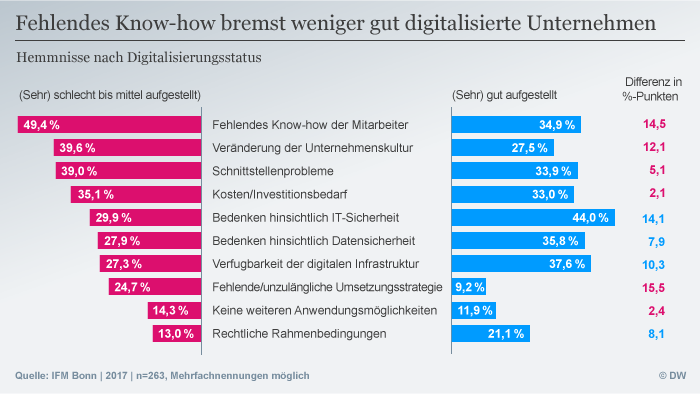Germany’s major family businesses are successfully in global markets. More than half of them but feels good on the digitalisation of industry is prepared, as the result of a current study.

Germany’s economy is booming, unemployment is low, and in many companies it runs really well. Most expect the next time be good for business. Also many family-run companies with mix in the meantime the world with their products, or dominate in your area of the world market. But when you look in the digital future, only 41 per cent feel under Germany’s largest family business, well or very well prepared. As the biggest obstacle to the digitisation of the companies see the lack of Know-how of the employees. This is the result of a current survey of the German Bank and of the Federal Association of German industry (BDI). For the study, the Institute for Mittelstand research (IfM) Bonn, polled more than 300 decision-makers in large family companies with at least 50 million euros in annual sales. On average, these companies earned in the last year, 307 million euros in sales and employed 1,488 employees. The results are part of the annual survey, “The largest family businesses in Germany”.

Other critical points lack of or insufficient digital interfaces, for example, for the Transfer of data to suppliers (37 percent), concerns about IT security (36 percent), as well as the necessary change in corporate culture (35 percent), according to the survey. But time is of the essence, says Stefan Bender, head of corporate customer business at Deutsche Bank. “Germany’s family businesses must be in the digitization of your business processes and your infrastructure quickly.” This is not only the automation, Bender, but especially to the adjustment of business models to the digital world. “The digitisation will be mixed in many industries. The innovation pressure on leading companies in Germany is on the rise.”
Expansion of the digital infrastructure required
Almost every third large family of companies with the infrastructure to be dissatisfied and sees this as a huge hurdle for the digitisation (32 percent). Because of the broadband supply in rural areas in the cities are significantly lagging behind, but around 70 percent of all industrial jobs are located in the country, should be finally done something, says Holger Lösch, Deputy BDI managing Director: “Less than a third of companies has a range of up to 50 megabits per second. For many future industrial applications, this is not enough. This is a cause for concern.”
The editorial recommends
Who takes over the family business?
Leaders of family firms retire, the question is, who is leading the operation. Unlike before, the gender plays in the decision, in the meantime, hardly a role. (19.01.2016)
Research Object Family Of Companies
An Institute at the University of Witten/Herdecke about the features of family-owned businesses under the microscope. Study results provide assistance in the solution of problems in the company. (18.09.2015)
Around 60 per cent of the respondents appreciate the importance of the digitization for one’s own company as high or very high. The companies intend to increase their investments in digitisation, therefore, until 2019, on average, about three percent of sales, compared to 2016, an increase of almost 40 percent. They rely, among other things, on Big Data: 58 percent expected for 2019, and that the use of large data volumes for business is of great importance. In 2016, this played only for 28 per cent an important role.
Smart products with Internet connectivity
Growth opportunities for the entrepreneur, see also Internet-enabled, so-called smart products. Currently, only 30 percent make at least one such product. “Smart products offer the company the opportunity to expand their business model to tailor services and to strengthen customer loyalty, highlights, Friederike Welter, President of the IfM Bonn. As a result, each second a manufacturer of smart products, additional sales making already.
tko/who (BDI, IfM)